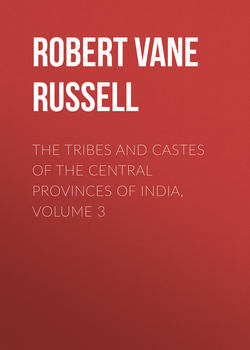Читать книгу The Tribes and Castes of the Central Provinces of India, Volume 3 - Robert Vane Russell - Страница 60
Gond
(f) Religion
42. Household gods
Оглавление“In almost every house,” Mr. Tawney states, “there is also a set of gods for everyday use. They are often the same as the village gods or those of the Deo-khulla and also include deified ancestors. These household gods have a tendency to increase, as special occasions necessitate the creation of a new god, and once he is enthroned in the house he never seems to leave it of his own accord. Thus if a man is killed by a cobra; he or the cobra becomes a household god and is worshipped for many generations. If a set of gods does not work satisfactorily, they are also, some or all of them, discarded and a new lot introduced. The form of the gods varies considerably, the only constant thing about them being the vermilion with which they are all daubed. They are sometimes all earthen cones and vary from that to miniature wooden tables. I may mention that it is somewhat difficult to get a Gond either to confess that he has any household gods or to show them. The best way is to send off the father of the family on some errand, and then to ask his unsuspecting wife to bring out the gods. You generally get them on a tray and some of the villagers will help her to name them.” In Mandla in every Gond’s house there is a Deothāna or god’s place, where all the gods are kept. Those who have children include Jhulān Devi, or the cradle goddess, among their household deities. In the Deothāna there is always a vessel full of water and a stick, and when a man comes in from outside he goes to this and sprinkles a little water over his body to free himself from any impurity he may have contracted abroad.
